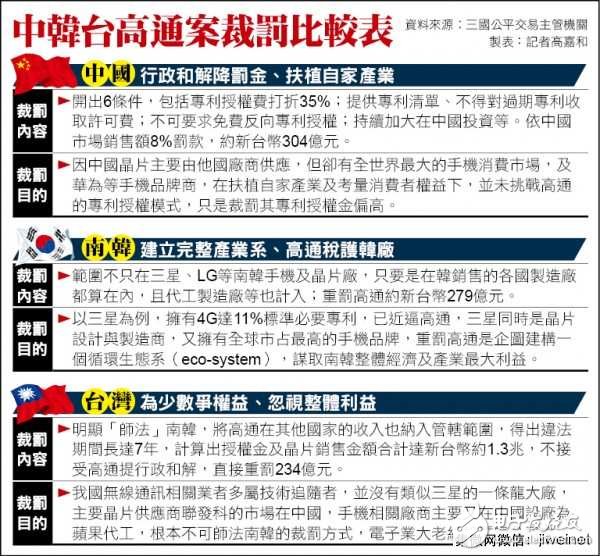According to the Taiwan Free Times, Taiwan's Fair Trade Commission has rejected Qualcomm's proposal for an administrative settlement and is set to impose a fine of NT$234 billion. Industry experts from the network manufacturing sector have analyzed the rulings in the Qualcomm case by both Chinese and South Korean authorities, noting that regardless of whether mainland China or South Korea is prioritizing overall economic and industrial interests, Taiwan’s approach appears less favorable. If the Qualcomm case drags on, Taiwanese manufacturers may not only continue paying higher royalties but also face long-term disadvantages in the 5G era. Mobile phone brands could be left behind, and network equipment makers might miss out on critical 5G base station opportunities. A settlement would be most beneficial for the overall interests of Taiwanese factories.

China-Korea-Taiwan High-Quality Cases Comparison Table
A senior executive from a network equipment manufacturer, who has closely followed international mobile phone competition, stated that Qualcomm has long charged a 5% patent licensing fee on the total device price, along with demands for reverse licensing, non-essential patents, and bundled authorizations—practices that are clearly unfair. While such authorization methods should indeed be regulated, the industrial structures in the three regions differ significantly, making it essential to consider the broader strategy when determining penalties. Authorities need to integrate various perspectives and issue penalties that align with long-term industry goals.
The regulator bluntly pointed out that Taiwan’s fair trade authority is making a big public announcement, sending cameras to the media, and claiming to have imposed the highest penalty in history. However, from an industry perspective, the purpose of the punishment remains unclear, and it fails to take into account international competition. This approach could harm downstream mobile phone and network equipment manufacturers, causing delays that last for years and missing crucial business opportunities due to lack of timeliness.
Taiwan Factories Pay Higher License Fees and Miss 5G Opportunities
In contrast, mainland China has resolved its issues with Qualcomm through negotiation. According to a regulator, the approach was clear and focused on promoting related industries. Previously, Chinese manufacturers were unable to export their phones without Qualcomm's patents, as seen in the case of Xiaomi being accused of selling devices in India. Eventually, they had to rely on Qualcomm's patent umbrella. After the settlement, Qualcomm reduced licensing fees by 60%, stopped reverse licensing, and no longer bundled non-essential patents. The terms were more lenient, allowing Chinese manufacturers to benefit from lower costs and patent protection for exports—clearly in their best interest.
Taiwan's Fair Trade Commission has refused Qualcomm's settlement offer. A director explained that this means Taiwanese companies will continue to pay higher patent license fees than their mainland counterparts, while legal battles could drag on for years. This delay would hurt 5G business opportunities, making it hard for local factories to keep up. In a fair competition environment, network equipment manufacturers risk losing out on critical 5G base station contracts, especially those requiring high-speed transmission capabilities.
Office Power,Office Atx Power Supply,Office Mute Atx Power,Office Mute Power
Boluo Xurong Electronics Co., Ltd. , https://www.greenleaf-pc.com